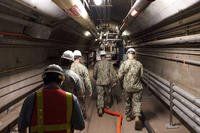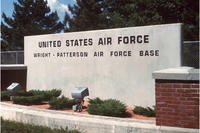MARINE CORPS AIR STATION CHERRY POINT, N.C. — Four EA-6B Prowlers belonging to each Prowler squadron at Marine Corps Air Station Cherry Point conducted a “Final Four” division flight at the air station March 1, 2016.
The squadrons have a very high operational tempo, so it is rare to see all four squadrons home at the same time. In an effort to highlight this platforms legacy, the “Final Four” flight came to fruition.
As technology changes and new innovations emerge, the Marine Corps acknowledges and remembers the accomplishments of this platform and what it has done for the nation during its time in service, and what it will continue to do over the next four years.
Marine Air-Ground Task Force Electronic Warfare is what the Marine Corps will transition to as the Prowler is replaced.
The MAGTF EW is a more distributed strategy where every platform contributes and functions as a sensor, shooter and sharer. This includes an EW node that moves relevant tactical information throughout the electromagnetic spectrum and across the battlefield faster than ever before.
Under MAGTF EW, the Marine Corps is leveraging emerging technologies and integrating multiple aviation platforms including, unmanned, fixed wing, and rotary wing assets, payloads, ground-based EW nodes, and cyber capabilities to provide commanders with an organic and persistent EW capability for every MAGTF.
The “Final Four” flight is the last time the Prowler squadrons will be flying together before the official retirement of Marine Tactical Electronic Warfare Training Squadron 1 at the end of Fiscal Year 16 and the eventual transition to MAGTF EW.
VMAQT-1 traces its lineage back to Korea when it was known as Marine Composite Squadron 1, flying electronic counter-measure missions for UN aircraft.
Throughout the years, it has been re-designated many times, and alongside the other Prowler squadrons flew combat missions in support of every conflict ranging from Vietnam to operations in Iran, the former Yugoslavia, Operations Iraqi/Enduring Freedom and everything in between.
It wasn’t until the summer of 2013 that VMAQT-1 assumed fleet replacement squadron responsibilities and was officially named VMAQT-1. Today, VMAQT-1 trains Prowler pilots, electronic countermeasure officers and maintainers, readying the men and women it trains to join the other three squadrons as they continue to conduct missions in support of joint and strategic objectives.
This integration of manned and unmanned airborne and ground EW capabilities will provide the MAGTF commander with greater flexibility and control of the electromagnetic spectrum and in many cases, will give the commander a capability where previously they had none.
MAGTF EW assets will be modular, scalable, and networked, utilizing an open architecture that is rapidly adaptable and remotely re-programmable at the tactical level to support future Marine Corps warfighting requirements.
As these legacy aircraft conduct their last flyover together, aboard MCAS Cherry Point, 2nd Marine Aircraft Wing respects the incredible support provided by the Marines of the Prowler squadrons over the years and looks forward to what the future will bring.
































